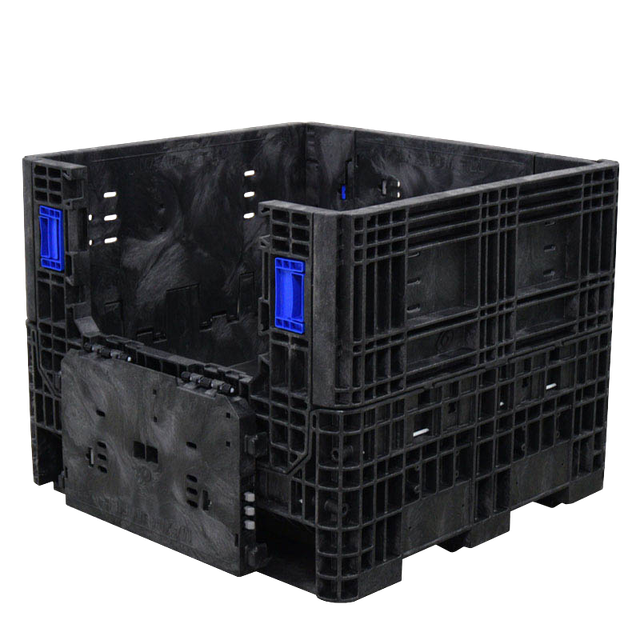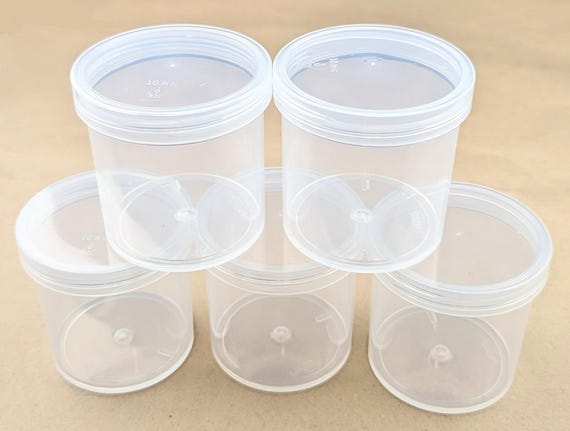The Function of Bulk Plastic Containers in Effective Recycling Practices and Sustainability
Bulk plastic containers are integral to modern-day reusing initiatives. Their style boosts the efficiency of product collection and transport, adding to sustainability goals. These containers not only maximize space however additionally aid in monitoring contamination degrees. Their execution is not without challenges. Recognizing the full extent of their influence discloses a complicated relationship in between logistics and environmental responsibility that requires additional expedition.
Understanding Mass Plastic Containers
Mass plastic containers work as a necessary part in different sectors, promoting the storage and transport of items. These containers are commonly made from durable materials such as high-density polyethylene (HDPE) or polypropylene, which supply resilience and resistance to environmental variables. Their design typically consists of attributes like stackability and modularity, permitting reliable use room throughout both storage space and transportation.
Industries such as farming, food handling, and making regularly use bulk plastic containers as a result of their light-weight nature and convenience of handling. The containers can be found in various dimensions and arrangements, satisfying the certain requirements of different products. Their versatility extends past plain functionality; they can also be customized with lids, handles, and labeling choices to improve use - Bulk Plastic Containers. As a result, bulk plastic containers play an important role in maximizing logistics and supply chain operations throughout numerous sectors, thereby adding to total performance and cost-effectiveness
Advantages of Making Use Of Bulk Plastic Containers in Recycling
The use of bulk plastic containers considerably boosts the performance of the process when companies prioritize reusing initiatives. These containers are created to optimize room, permitting the storage space and transport of larger quantities of recyclable products. This causes fewer journeys to reusing facilities, consequently decreasing gas intake and connected discharges.
Furthermore, bulk plastic containers are resistant and long lasting to numerous environmental factors, making sure that materials remain secured during handling and transportation. Their lightweight style additionally adds to decrease transport expenses.
The harmony of these containers helps with far better sorting and processing of recyclable products, which can boost overall recycling prices. Organizations that take on bulk plastic containers also show a dedication to sustainability, positively affecting their brand name image. Ultimately, these benefits not only enhance recycling methods however likewise add to more comprehensive environmental objectives
Exactly How Bulk Plastic Containers Facilitate Material Collection
Reliable product collection is substantially enhanced by the usage of mass plastic containers, as they give a structured and effective service for gathering recyclable items. These containers are made to fit big volumes of materials, which streamlines the sorting and storage space process. Their stackable layout takes full advantage of area application, making it less complicated for centers to organize recyclables without clutter.
On top of that, mass plastic containers are weather-resistant and sturdy, allowing for outside placement without deterioration. This strength ensures that materials stay secured till they are gathered for processing.

The uniformity in shapes and size of these containers assists in standardization throughout collection points, allowing far better monitoring of recyclable quantities. Their transparent nature permits for easy presence of contents, helping in the monitoring of contamination levels and guaranteeing that only proper materials are collected. Generally, bulk plastic containers play an essential role in streamlining the material collection procedure, thereby advertising reliable recycling techniques.
Transportation Efficiency and Environmental Impact
Transportation efficiency plays a crucial function in the reusing process, especially via the optimization of lots capability wholesale plastic containers. By making the most of the volume of product carried, companies can significantly minimize the variety of trips needed, therefore minimizing their carbon footprint. This approach not just boosts functional effectiveness however additionally adds to much more lasting ecological techniques.

Maximizing Load Ability
Enhancing lots capacity is often overlooked, it plays a vital role in boosting transportation effectiveness and minimizing environmental impact in recycling practices. By making best use of the volume that mass plastic containers can hold, recycling procedures can lower the number of trips required for transportation. This not only decreases fuel intake but also lowers the deterioration on automobiles. Efficient tons monitoring enables centers to use space successfully, ensuring that each transport cycle is as effective as possible. Additionally, well-optimized loads can cause far better negotiations with logistics service providers, possibly reducing general costs. Eventually, improving load capability adds to an extra sustainable reusing system by cultivating efficient resource usage and minimizing waste generated throughout transportation.
Reducing Carbon Impact
As reusing procedures endeavor to decrease their ecological impact, reducing the carbon impact connected with transportation arises as an essential goal. Mass plastic containers play a crucial role in achieving this purpose by enhancing load performance and optimizing logistics. Their lightweight yet resilient layout enables maximum cargo room use, minimizing the variety of journeys called for to carry materials. By combining deliveries, recycling centers can decrease gas usage and greenhouse gas discharges. Additionally, strategically locating recycling centers lessens transport ranges, in addition reducing carbon results. Moreover, utilizing fuel-efficient vehicles and different energy resources enhances overall sustainability. By integrating these techniques, the reusing industry can appreciably decrease its carbon impact, adding to a much more sustainable future.
Difficulties in making use of Bulk Plastic Containers

Contamination Concerns
Contamination issues stand for a considerable obstacle in the reliable use mass plastic containers within reusing practices. These containers typically collect residues from previous materials, causing blended materials that can impede the reusing process. Pollutants such as food waste, chemicals, or non-recyclable materials can jeopardize the integrity of the entire set, causing boosted disposal prices and lowered recycling prices. Furthermore, improper cleansing or sorting can worsen these concerns, making it challenging for reusing facilities to process materials effectively. The visibility of pollutants not just impacts the high quality of recycled items however additionally threatens the general sustainability efforts aimed at minimizing plastic waste. Resolving these contamination difficulties is crucial for boosting the efficiency of mass plastic container recycling.
Recycling Infrastructure Limitations
Ineffectiveness in reusing facilities poses substantial obstacles for the reliable administration of mass plastic containers. Lots of recycling centers lack the capability plastic bulk containers to process big volumes of these containers efficiently, causing enhanced delays and prices. Inadequate sorting modern technologies frequently lead to contamination, as mass containers may be mixed with various other products, complicating the recycling process. Limited transportation options also impede the activity of bulk plastic containers to ideal recycling centers, leading to raised garbage dump waste. Furthermore, a lack of standard protocols for mass container recycling produces complication amongst organizations and consumers, better making complex initiatives to advertise sustainability. Attending to these facilities constraints is necessary to enhance reusing techniques and optimize the possibility of mass plastic containers in a round economic situation.
Ideal Practices for Applying Mass Plastic Containers
They ought to focus on a strategic technique that boosts effectiveness and minimizes contamination risks when companies think about executing mass plastic containers in their reusing practices. Initially, picking the appropriate container dimension and kind is vital to suit the quantity of products being processed. Organizations needs to additionally develop clear labeling and signs to lead individuals on appropriate disposal techniques, minimizing confusion and mistakes. Normal training sessions for personnel can additionally enhance these methods, making sure everybody understands their roles in keeping reusing stability.
Furthermore, organizations should implement a regular maintenance schedule to inspect and tidy containers, stopping the build-up of pollutants. Partnering with neighborhood recycling centers can likewise enhance the collection process, ensuring that products are successfully processed. Organizations need to keep an eye on and assess their recycling metrics, using this data to improve techniques over time and promote continual renovation in their sustainability initiatives.
The Future of Mass Plastic Containers in Sustainable Practices
As companies increasingly focus on sustainability, the role of mass plastic containers in reusing techniques is readied to advance considerably. Technologies in products science are bring about the development of eco-friendly and recyclable choices, improving the ecological benefits of mass plastic containers. On top of that, the application of closed-loop systems will certainly allow for much easier collection and repurposing of these containers, decreasing waste and source consumption.
Technological improvements, such as smart tracking systems, will certainly enable companies to check the lifecycle of bulk containers, enhancing effectiveness in recycling processes. As consumer need for sustainable practices expands, organizations will likely adopt bulk plastic containers created for reuse and long-term worth. Collaboration between federal governments and sectors will certainly promote the establishment of standard recycling procedures, making sure that mass containers are efficiently integrated into more comprehensive sustainability efforts. Overall, the future of bulk plastic containers appears appealing, with substantial potential for adding to a circular economy.
Frequently Asked Inquiries
How Are Bulk Plastic Containers Made and What Materials Are Used?
Mass plastic containers are normally made from high-density polyethylene (HDPE) or polypropylene (PP) These products are processed through shot molding or impact molding strategies, leading to resilient, lightweight containers appropriate for various storage space and transport needs.
Can Bulk Plastic Containers Be Recycled Several Times Before Recycling?
Yes, bulk plastic containers can be reused several times prior to recycling. Their durability and layout permit duplicated use in numerous applications, promoting sustainability and resource efficiency while reducing the demand for new containers.

What Certifications Exist for Mass Plastic Containers in Recycling?
Different certifications for bulk plastic containers include the Recycling Partnership's qualification, the Cradle to Cradle Licensed ™ criterion, and the Sustainable Packaging Coalition's guidelines, making certain containers satisfy particular environmental and recyclability requirements for effective recycling.
Exactly How Do Mass Plastic Containers Contrast to Various Other Recycling Storage Options?
Bulk plastic containers offer greater longevity and capability contrasted to other recycling storage choices, reducing the danger of contamination and promoting reliable transportation. Their design supports far better organization, improving total efficiency in recycling procedures.
What Is the Life-span of a Bulk Plastic Container in Recycling Processes?
The life expectancy of a bulk plastic container in reusing procedures normally varies from 5 to one decade, relying on usage, material high quality, and ecological conditions, enabling several cycles of use before eventual disposal or recycling.
When companies focus on reusing efforts, the application of bulk plastic containers significantly improves the effectiveness of the procedure. Transport performance plays an important duty in the recycling process, particularly through the optimization of load capability in mass plastic containers. The usage of bulk plastic containers in recycling practices faces significant challenges, particularly worrying contamination issues and restrictions within recycling infrastructure. Contamination issues stand for a substantial difficulty in the reliable usage of bulk plastic containers within recycling methods. When companies take into consideration carrying out bulk plastic containers in their recycling practices, they ought to prioritize a strategic strategy that improves effectiveness and decreases contamination risks.